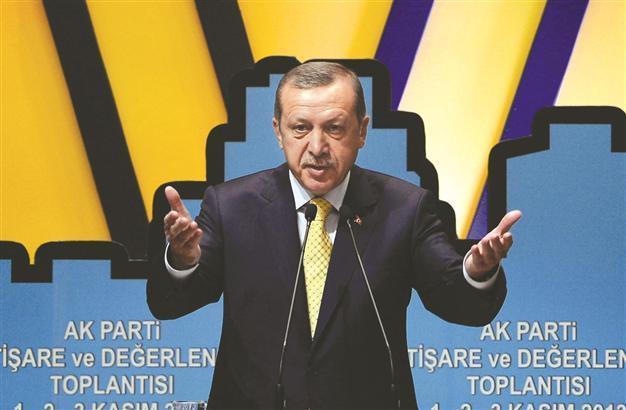Turkish government consults every segment of society: PM Erdoğan
ANKARA - Hürriyet Daily News

‘In the history of the Republic, no government has ever opened its heart to different segments as how we have done. Every criticism has a unique value for us,’ Erdoğan says. AA Photo
Since first coming to power in November 2002, the ruling Justice and Development Party (AKP) has constantly lent an ear to various segments of society in order reach a common path, Prime Minister Recep Tayyip Erdoğan has said.Delivering a closing speech at a key party meeting on Nov. 3, the 11th year anniversary of AKP rule, Erdoğan sought to address concerns that his government was becoming increasingly “authoritarian.” He underlined the importance he and his party attaches to “consultation” as a “common principle,” and vowed to continue doing the same.
“We will continue increasing consultation with all segments of society, in order to protect the rights of people who haven’t voted for us as much as we protect rights of people who have voted for us,” the prime minister said, using a somewhat softer tone compared to what is usually the case in speeches delivered at the AKP’s Consultation and Evaluation Meetings.
Under normal conditions, these meetings have been held twice a year since the founding of the AKP, and the latest three-day gathering kicked off on Nov. 1, just one day after Parliament witnessed four female AKP deputies attend the General Assembly wearing headscarves, encountering no harsh objection from any of the opposition parties.
The headscarf issue was therefore expected to take a wide place in Erdoğan’s address as a landmark achievement, as the issue has been a matter of controversy for decades. However, he did not once mention the General Assembly meeting on Oct. 31, and also did not refer to the government’s abolition of a headscarf ban for female public servants as part of a “democratization package,” which paved the way for the Oct. 31 move.
Instead, in the run-up to local elections in March 2014, Erdoğan chose to use the occasion for delivering messages of “unity.” Some observers suggested that his choice of tone and content was actually a veiled response to growing accusations that his government is polarizing society.
“In the history of the Republic, no government has ever opened its heart to different segments as how we have done. Every criticism has a unique value for us. A world where everybody is of the same opinion would be extremely colorless and boring. We are exerting efforts to form common sense and acting within the framework of this common sense in every field,” Erdoğan said.
In contrast to the prime minister’s speech, the top item on the agenda of closed-door meetings at the Kızılcahamam gathering was the abolition of a headscarf ban for female public servants and the subsequent move for the four AKP deputies to enter Parliament with headscarves.
“What is abnormal is to refuse headscarved girls at the doors of universities, and to not have them in universities. The oddity is not having headscarved women enter parliament, but the fact that they were not allowed to do so until today. What happened [after allowing them in Parliament]? Look, it has been normalized. Now, love is crowned, solidarity is crowned,” Erdoğan was quoted as saying by party members during closed-door meetings, where he emphasized the concept of a “New Turkey.”
Göksel Bozkurt from the Ankara bureau contributed to this report
















